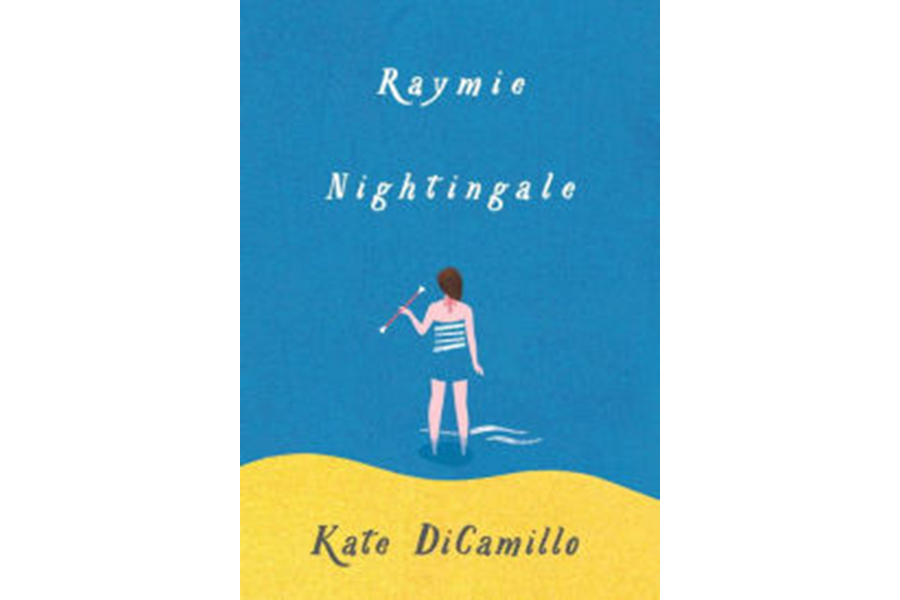'Raymie Nightingale' is Kate DiCamillo's new tale of friendship and longing
Loading...
If John Steinbeck’s “Of Mice and Men” had been written for children, it might have looked something like Kate DiCamillo’s new novel, Raymie Nightingale. In this story by the Newbery Medal-winning author, bonds of sisterhood hold strong even as the best-laid plans (of 10-year-olds) go very, very awry. Like George, the protagonist in “Of Mice and Men,” the main character in DiCamillo’s book, a thoughtful fourth-grader named Raymie Clarke, has a dream and a plan.
Two days ago, her father ran off with a dental hygienist. Raymie’s scheme: to get him back. Her strategy is simple. She’ll learn to twirl the baton, win the Little Miss Central Florida Tire Competition, get her picture in the paper, and capture her father’s attention, thereby bringing him home. It doesn’t sound that far-fetched, minus the fact that Raymie has no baton-twirling skills and her chances of winning the competition are slim at best. Never mind! Like Steinbeck’s George, Raymie is nothing if not a believer in dreams. And because she is a child, Raymie is also a believer in magic … which she’ll need more than a touch of to pull off her plan.
“Raymie Nightingale” isn’t exactly magical realism. But DiCamillo understands the way children think, and so the story sparkles with bits of fairy dust – not real magic, but the hope, imagination, and expectation of childhood that make moments of this sun-drenched tale seem almost magical. And in a way, isn’t that what it feels like when a wish comes true? As though something bigger or more powerful than we are has blessed our hopes and longings?
There are lots of characters with plans and hopes in this story. At her first baton-twirling lesson, Raymie meets two of them: the dramatic Louisiana Elefante, and the menacing Beverly Tapinski. Both girls also have their sights set on the Little Miss Central Florida Tire competition, but for very different reasons. Louisiana has dreams of using her winnings to rescue Archie, the beloved cat she was forced to relinquish to the Very Friendly Animal Center. Beverly, a disgruntled pageant child, has plans to sabotage the whole thing.
Together, these three girls form an unlikely trio – allied against a complex, confusing, and sometimes frightening adult world. But what begins as a partnership of convenience soon develops into a tentative friendship, with the girls supporting each other, getting in on each others’ schemes, and learning a little more about each other and themselves in the process. For all its childhood wonder and starry-eyed dreaminess, “Raymie Nightingale” is still a melancholy story, perhaps better suited for the upper end of elementary school readership.
Likewise, it echoes Steinbeck’s tale in the way it hums with age-appropriate foreboding. The multiple allusions to death and disappointment don’t make this a dark book but certainly one that’s clear on the realities of the unpredictable world its characters inhabit. What saves those characters – and the reader – from a thoroughly cataclysmic conclusion is the resilience of childhood, which shimmers even in the face of deflated dreams.
In DiCamillo’s tale, the best-laid plans actually go awry for the better. And though the outcome may not be exactly what the characters hoped for, it’s still surprisingly satisfying. In a lovely twist, the unpredictability that initially threatened Raymie’s dearest hopes ends up being a strengthening agent, allowing her to discover reserves of fortitude she didn’t know she had.
Having faced and overcome disappointment, she gains wisdom. And rather than give up on her dreams, she builds on what she’s learned – and makes new ones. I wouldn’t call “Raymie Nightingale” a comforting story, but unlike “Of Mice and Men,” it is a hopeful one. Dreams fizzle but are reignited. Some people will disappoint us, but others we can depend on. Bad things happen, but good things do, too.
Like Steinbeck, DiCamillo tells it like she sees it – just through the rosier lens of childhood. Which is why her book, also like Steinbeck’s, may turn out to be a tale of friendship and longing that becomes a classic.








